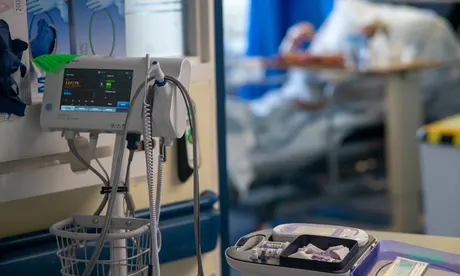
People experiencing severe illness suspected to be sepsis must promptly receive life-saving access to antibiotics to avert unnecessary fatalities, as outlined in updated guidance from the National Institute for Health and Care Excellence (Nice).
The revised guidelines emphasize the utilization of the national early warning score to assess individuals aged 16 and above with suspected sepsis in an acute hospital setting or ambulance, who are not and have not recently been pregnant.
This national early warning score is a tool endorsed by NHS England to standardize the assessment of severe illnesses in adults.
Sepsis, also known as blood poisoning, is a potentially fatal condition where the body attacks its own tissues and organs in response to an infection.
The gravity of this condition is reflected in the estimated 200,000 hospitalizations and 48,000 deaths it causes annually in the UK. The updated guidelines also advocate for a more thoughtful approach to antibiotic prescription, aiming to reduce the risk of antibiotic resistance in cases of less severe sepsis.
With this update, Nice recommends that a broader segment of the population be categorized at a lower risk level, necessitating confirmation of a sepsis diagnosis before administering antibiotics.

This approach aligns with the objective of minimizing unnecessary antibiotic use and contributes to the broader effort to address antibiotic resistance.
Professor Jonathan Benger, Nice’s chief medical officer, underscores the significance of these guidelines: “This useful and usable guidance will help ensure antibiotics are targeted to those at the greatest risk of severe sepsis, so they get rapid and effective treatment.
It also supports clinicians to make informed, balanced decisions when prescribing antibiotics.”
Sepsis can be challenging to diagnose, emphasizing the critical role of clear guidance and the updated national early warning score. The intention is to identify illnesses promptly, ensuring that individuals receive appropriate treatment in the correct clinical setting, ultimately contributing to saving lives.
This update is part of a continuous effort to keep Nice guidance current. Recognizing the dynamic nature of healthcare and evolving medical knowledge, these planned updates aim to ensure that healthcare professionals have the most up-to-date and effective guidance at their disposal.
Dr. Ron Daniels, founder and joint chief executive of the UK Sepsis Trust, applauds Nice’s initiative: “We welcome that Nice has provided this important update to their national guidance.
We particularly support that the update continues to recommend the identification of high-risk factors while reinforcing the importance of clinical judgment to prevent injudicious use of antibiotics.”
The guidance further recommends that general practitioners (GPs) and ambulance services carefully consider how antibiotics are administered to individuals at high risk of sepsis, a measure particularly relevant as transit times increase. This strategic approach holds the potential to transform patient outcomes significantly.
Dr. Daniels also highlights the positive impact of these revisions in establishing a coordinated and cohesive approach to recognizing and managing sepsis across the NHS. The UK Sepsis Trust is committed to supporting the updated Nice guideline with a suite of clinical tools, fostering their utilization by healthcare practitioners to save lives.
In conclusion, the updated guidance from Nice serves as a pivotal step in addressing sepsis, offering a comprehensive framework to identify, assess, and treat individuals at risk, while simultaneously promoting responsible antibiotic use to mitigate the challenges of antibiotic resistance.
The collaboration between healthcare professionals, regulatory bodies, and organizations such as the UK Sepsis Trust reflects a unified commitment to enhancing patient outcomes and ensuring the highest standards of care in the face of sepsis.